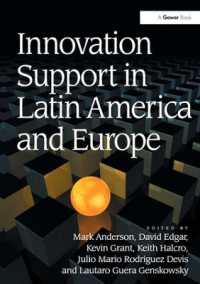- ホーム
- > 洋書
- > 英文書
- > Politics / International Relations
基本説明
Providing a positive audit of the war on terror (which they contend should be understood as a Second Cold War) the authors charge that the Bush Doctrine has been consistent with past foreign policies—from Republican and Democratic presidencies—and that the key elements of Bush's grand strategy will rightly continue to shape America's approach in the future.
Full Description
The foreign policy of the George W. Bush administration has won few admirers, and many anticipate that his successor will repudiate the actions of the past eight years. In their provocative account Lynch and Singh argue that Bush's policy should be placed within the mainstream of the American foreign policy tradition. Further, they suggest that there will, and should, be continuity in US foreign policy from his presidency to those of his successors. Providing a positive audit of the war on terror (which they contend should be understood as a Second Cold War) they maintain that the Bush doctrine has been consistent with past policy at times of war and that the key elements of Bush's grand strategy will continue to shape America's approach in the future. Above all, they predict that his successors will pursue the war against Islamist terror with similar dedication.
Contents
Introduction: winning the Second Cold War; 1. Bush and the American foreign policy tradition; 2. The constitution of American national security; 3. The Second Cold War on Islamist terror: negative audits; 4. The Second Cold War on Islamist terror: a positive audit; 5. Iraq: Vietnam in the sand?; 6. The Middle East: reformation or Armageddon?; 7. Friends and foes after Bush; 8. The emerging consensus at home and abroad; Conclusion: the case for continuity.







